Yi Jing Hexagram 51 - Line 6
The hexagram: 51
An hexagram is a combination of six yin and yang lines.
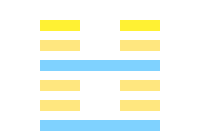
51.6 (51 > 21) - THE KĂN HEXAGRAM.
The topmost line, divided, shows its subject, amidst the startling movements (of the time), in breathless dismay and looking round him with trembling apprehension. If he take action, there will be evil. If, while the startling movements have not reached his own person and his neighbourhood, (he were to take precautions), there would be no error, though his relatives might (still) speak against him.
Bing DeepL Google Yandex51.6 (51 > 21) - Taking refuge in the heights
One has lost the weakest, so one keeps a low profile until they change.
Bing DeepL Google Yandex51.6 (51 > 21) - Taking refuge in the heights
One has lost the weakest, so one keeps a low profile until they change.
Bing DeepL Google Yandex51.6 (51 > 21) - Kán, l’ébranlement
Kán : tonnerre, effroi répandu, crainte.
Le tonnerre répand l’effroi et fait partout regarder avec trouble et crainte. S’il atteint et frappe, il causera un grand mal. (Ou : il corrige le mal.) Mais s’il ne frappe ni tel personnage, ni ses voisins, ce ne sera point un mal et fera seulement jaser les habitants d’une même maison.
Quand le tonnerre gronde, que l’orage éclate, le sage recherche la cause de ce fait (et tâche de profiter de l’avertissement céleste).
51.6 (51 > 21) - Se réfugier dans les hauteurs
On a perdu les plus faibles alors on reste discret jusqu'à ce qu'ils changent.
Bing DeepL Google Yandex51.6 (51 > 21) - Megrázkódtatás
Elvesztette a leggyengébbet, visszafogottnak kell maradnia míg nem változnak.
Bing DeepL Google YandexThe trigrams
The trigrams are combinations of three yin and yang lines. The three bottom lines of the hexagram form the lower trigram and represent the inner situation. The three top lines form the upper trigram and represent the outer situation.
trigSup2


trigInf

The nuclear hexagram: 39
The nuclear hexagram is the association of the two inner trigrams (lines 2,3,4 and 3,4,5). It represents the root, or the origin of the situation.

39 - THE KIEN HEXAGRAM.
In (the state indicated by) Kien advantage will be found in the south-west, and the contrary in the north-east. It will be advantageous (also) to meet with the great man (In these circumstances), with firmness and correctness, there will be good fortune.
Bing DeepL Google Yandex39 - Uncertainty
Solving a difficulty requires a patient study. If one fails, one will receive help after showing that one has done one's best.
Bing DeepL Google Yandex39 - Uncertainty
Solving a difficulty requires a patient study. If one fails, one will receive help after showing that one has done one's best.
Bing DeepL Google Yandex39 - Kién, l’obstacle
Kién : Difficulté, danger, noble hardiesse.
Texte
Énergie dans les difficultés ; peut réussir d’un côté et pas de l’autre. Par son succès se montre le grand homme. Sa perfection est heureuse et peut sauver des périls.
Symbolisme
L’eau sur une montagne. Par la vertu de l’énergie, l’homme sage se corrige et perfectionne sa vertu.
Commentaire
Kién est difficulté, danger se présentant en face ; si, voyant le danger, on sait rester ferme, quelle grande sagesse ! Le succès ou l’insuccès vient de ce que l’on garde la voie droite ou que la sagesse est à bout. On reconnaît à cela l’homme vraiment grand et plein de mérites. Il faut rester ferme dans la justice et la bonté pour établir fermement un État. Oh ! que le moment des difficultés a d’importance !
39 - L'incertitude
Pour résoudre une difficulté, on doit l'étudier patiemment. Si l'on échoue, on recevra de l'aide après avoir montré que l'on a fait le maximum.
Bing DeepL Google Yandex39 - Bizonytalanság
Hogy megoldja a problémát, meg kell vizsgálnia türelmesen. Ha valaki hibázott, segítséget kap miután megmutatja hogy minden tőle telhetőt megtett.
Bing DeepL Google YandexThe derived (Fan Yao)
The same line number on the mutated hexagram. It reperesents what can be done AFTER to correct the situation described by this line, as a sort of remedy or solution.
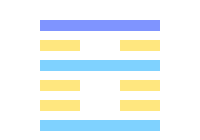
21.6 (21 > 51) - THE SHIH HO HEXAGRAM.
The sixth line, undivided, shows one wearing the cangue, and deprived of his ears. There will be evil.
Bing DeepL Google Yandex21.6 (21 > 51) - Condemning the lack of care
One has stopped being unstable but others are waiting for answers before one can rest.
Bing DeepL Google Yandex21.6 (21 > 51) - Condemning the lack of care
One has stopped being unstable but others are waiting for answers before one can rest.
Bing DeepL Google Yandex21.6 (21 > 51) - Shih hok, mordre au travers
Shih hok : 1. Bavardage mordant, méchant ; 2. Hok : mordre, mâcher.
Les pieds aux fers et les oreilles coupées, châtiment terrible n’est-ce pas ? Mais (le méchant calomniateur) entend (ces menaces) et ne comprend pas.
Bing DeepL Google Yandex21.6 (21 > 51) - Condamner le manque d'attention
On a cessé d'être instable mais les autres attendent des réponses avant que l'on puisse se reposer.
Bing DeepL Google Yandex21.6 (21 > 51) - Döntés
Már nem bizonytalankodik de a többiek még válaszokat várnak mielőtt pihenhetne.
Bing DeepL Google YandexThe juncture: 22.1
The derived of the reciprocal. It represents what could have been done BEFORE to prevent the situation described by this line, as a sort of remedy or solution.

22.1 (22 > 52) - THE PÎ HEXAGRAM.
The first line, undivided, shows one adorning (the way of) his feet. He can discard a carriage and walk on foot.
Bing DeepL Google Yandex22.1 (22 > 52) - Pî, la grâce
Pi : 1. Éclat, rayon, orner ; 2. Exercer, rendre fort.
On fortifie ses pieds, on les orne en quittant son char et allant à pied (par vertu). Com. Kang teh.
Bing DeepL Google Yandex22.1 (22 > 52) - Se faire lâcher
On nous fait confiance pour réussir sans aide.
Bing DeepL Google YandexThe reciprocal: 52.1
The hexagram upside down. It represents the opposite situation, and as such is insturmental when validating comments.

52.1 (52 > 22) - THE KĂN HEXAGRAM.
The first line, divided, shows its subject keep- ing his toes at rest. There will be no error; but it will be advantageous for him to be persistently firm and correct.
Bing DeepL Google Yandex52.1 (52 > 22) - Dropping one's probe
One is not going to see what others are doing, to avoid trouble.
Bing DeepL Google Yandex52.1 (52 > 22) - Dropping one's probe
One is not going to see what others are doing, to avoid trouble.
Bing DeepL Google Yandex52.1 (52 > 22) - Kán, l’arrêt
Kán : ferme, tenir droit, bien réglé, arrêter, reposer
(On doit) tenir fermes ses pieds ; i. e. être toujours d’une ferme droiture.
Ne jamais perdre sa droiture.
52.1 (52 > 22) - Renoncer à son enquête
On ne va pas voir ce que font les autres, pour éviter les ennuis.
Bing DeepL Google Yandex52.1 (52 > 22) - Megállás
Nem megy megnézni mit tesznek a többiek hogy kerülje a bajokat.
Bing DeepL Google YandexMutations

51.6 (51 > 21) - THE KĂN HEXAGRAM.
The topmost line, divided, shows its subject, amidst the startling movements (of the time), in breathless dismay and looking round him with trembling apprehension. If he take action, there will be evil. If, while the startling movements have not reached his own person and his neighbourhood, (he were to take precautions), there would be no error, though his relatives might (still) speak against him.
Bing DeepL Google Yandex51.6 (51 > 21) - Taking refuge in the heights
One has lost the weakest, so one keeps a low profile until they change.
Bing DeepL Google Yandex51.6 (51 > 21) - Taking refuge in the heights
One has lost the weakest, so one keeps a low profile until they change.
Bing DeepL Google Yandex51.6 (51 > 21) - Kán, l’ébranlement
Kán : tonnerre, effroi répandu, crainte.
Le tonnerre répand l’effroi et fait partout regarder avec trouble et crainte. S’il atteint et frappe, il causera un grand mal. (Ou : il corrige le mal.) Mais s’il ne frappe ni tel personnage, ni ses voisins, ce ne sera point un mal et fera seulement jaser les habitants d’une même maison.
Quand le tonnerre gronde, que l’orage éclate, le sage recherche la cause de ce fait (et tâche de profiter de l’avertissement céleste).
51.6 (51 > 21) - Se réfugier dans les hauteurs
On a perdu les plus faibles alors on reste discret jusqu'à ce qu'ils changent.
Bing DeepL Google Yandex51.6 (51 > 21) - Megrázkódtatás
Elvesztette a leggyengébbet, visszafogottnak kell maradnia míg nem változnak.
Bing DeepL Google Yandex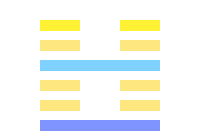
51.1.6 (51 > 35) - THE KĂN HEXAGRAM.
- 1. The first line, undivided, shows its subject, when the movement approaches, looking out and around with apprehension, and afterwards smiling and talking cheerfully. There will be good fortune.
- 6. The topmost line, divided, shows its subject, amidst the startling movements (of the time), in breathless dismay and looking round him with trembling apprehension. If he take action, there will be evil. If, while the startling movements have not reached his own person and his neighbourhood, (he were to take precautions), there would be no error, though his relatives might (still) speak against him.
51.1.6 (51 > 35) - Shock
One is expert at making others say the opposite of what they wanted.
Bing DeepL Google Yandex51.1.6 (51 > 35) - Shock
One is expert at making others say the opposite of what they wanted.
Bing DeepL Google Yandex51.1.6 (51 > 35) - Kán, l’ébranlement
Kán : tonnerre, effroi répandu, crainte.
- 1. Le tonnerre approchant, on est plein d’effroi ; puis, quand il est passé, on sourit et on parle tous ensemble (on passe de la crainte à la joie).
-
6. Le tonnerre répand l’effroi et fait partout regarder avec trouble et crainte. S’il atteint et frappe, il causera un grand mal. (Ou : il corrige le mal.) Mais s’il ne frappe ni tel personnage, ni ses voisins, ce ne sera point un mal et fera seulement jaser les habitants d’une même maison.
Quand le tonnerre gronde, que l’orage éclate, le sage recherche la cause de ce fait (et tâche de profiter de l’avertissement céleste).
51.1.6 (51 > 35) - Le choc
On est expert dans l'art de faire dire aux autres le contraire de ce qu'ils souhaitaient.
Bing DeepL Google Yandex51.1.6 (51 > 35) - Megrázkódtatás
- 1. Nevethet miután meglátja.
- 6. Elvesztette a leggyengébbet, visszafogottnak kell maradnia míg nem változnak.
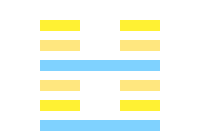
51.2.6 (51 > 38) - THE KĂN HEXAGRAM.
- 2. The second line, divided, shows its subject, when the movement approaches, in a position of peril. He judges it better to let go the articles (in his possession), and to ascend a very lofty height. There is no occasion for him to pursue after (the things he has let go) ; in seven days he will find them.
- 6. The topmost line, divided, shows its subject, amidst the startling movements (of the time), in breathless dismay and looking round him with trembling apprehension. If he take action, there will be evil. If, while the startling movements have not reached his own person and his neighbourhood, (he were to take precautions), there would be no error, though his relatives might (still) speak against him.
51.2.6 (51 > 38) - Shock
One guesses what to do, but others want logical reasoning.
Bing DeepL Google Yandex51.2.6 (51 > 38) - Shock
One guesses what to do, but others want logical reasoning.
Bing DeepL Google Yandex51.2.6 (51 > 38) - Kán, l’ébranlement
Kán : tonnerre, effroi répandu, crainte.
- 2. Quand le tonnerre gronde, le danger arrive, on croit devoir tout abandonner et se retirer en un lieu sûr et élevé. Qu’on ne s’obstine pas à rechercher alors ce qu’on a abandonné ; on le retrouvera quelque temps après. (Quand le danger sera passé.)
-
6. Le tonnerre répand l’effroi et fait partout regarder avec trouble et crainte. S’il atteint et frappe, il causera un grand mal. (Ou : il corrige le mal.) Mais s’il ne frappe ni tel personnage, ni ses voisins, ce ne sera point un mal et fera seulement jaser les habitants d’une même maison.
Quand le tonnerre gronde, que l’orage éclate, le sage recherche la cause de ce fait (et tâche de profiter de l’avertissement céleste).
51.2.6 (51 > 38) - Le choc
On devine ce qu'il faut faire mais les autres veulent un raisonnement logique.
Bing DeepL Google Yandex51.2.6 (51 > 38) - Megrázkódtatás
- 2. Ne keresse ami elveszett.
- 6. Elvesztette a leggyengébbet, visszafogottnak kell maradnia míg nem változnak.
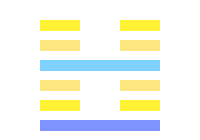
51.1.2.6 (51 > 64) - THE KĂN HEXAGRAM.
- 1. The first line, undivided, shows its subject, when the movement approaches, looking out and around with apprehension, and afterwards smiling and talking cheerfully. There will be good fortune.
- 2. The second line, divided, shows its subject, when the movement approaches, in a position of peril. He judges it better to let go the articles (in his possession), and to ascend a very lofty height. There is no occasion for him to pursue after (the things he has let go) ; in seven days he will find them.
- 6. The topmost line, divided, shows its subject, amidst the startling movements (of the time), in breathless dismay and looking round him with trembling apprehension. If he take action, there will be evil. If, while the startling movements have not reached his own person and his neighbourhood, (he were to take precautions), there would be no error, though his relatives might (still) speak against him.
51.1.2.6 (51 > 64) - Shock
One shows a little enthusiasm to not disappoint one's most fervent admirers.
Bing DeepL Google Yandex51.1.2.6 (51 > 64) - Shock
One shows a little enthusiasm to not disappoint one's most fervent admirers.
Bing DeepL Google Yandex51.1.2.6 (51 > 64) - Kán, l’ébranlement
Kán : tonnerre, effroi répandu, crainte.
- 1. Le tonnerre approchant, on est plein d’effroi ; puis, quand il est passé, on sourit et on parle tous ensemble (on passe de la crainte à la joie).
- 2. Quand le tonnerre gronde, le danger arrive, on croit devoir tout abandonner et se retirer en un lieu sûr et élevé. Qu’on ne s’obstine pas à rechercher alors ce qu’on a abandonné ; on le retrouvera quelque temps après. (Quand le danger sera passé.)
-
6. Le tonnerre répand l’effroi et fait partout regarder avec trouble et crainte. S’il atteint et frappe, il causera un grand mal. (Ou : il corrige le mal.) Mais s’il ne frappe ni tel personnage, ni ses voisins, ce ne sera point un mal et fera seulement jaser les habitants d’une même maison.
Quand le tonnerre gronde, que l’orage éclate, le sage recherche la cause de ce fait (et tâche de profiter de l’avertissement céleste).
51.1.2.6 (51 > 64) - Le choc
On fait preuve d'un peu enthousiasme pour ne pas décevoir ses admirateurs les plus fervents.
Bing DeepL Google Yandex51.1.2.6 (51 > 64) - Megrázkódtatás
- 1. Nevethet miután meglátja.
- 2. Ne keresse ami elveszett.
- 6. Elvesztette a leggyengébbet, visszafogottnak kell maradnia míg nem változnak.
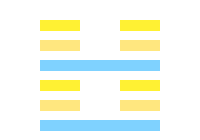
51.3.6 (51 > 30) - THE KĂN HEXAGRAM.
- 3. The third line, divided, shows its subject distraught amid the startling movements going on. If those movements excite him to (right) action, there will be no mistake.
- 6. The topmost line, divided, shows its subject, amidst the startling movements (of the time), in breathless dismay and looking round him with trembling apprehension. If he take action, there will be evil. If, while the startling movements have not reached his own person and his neighbourhood, (he were to take precautions), there would be no error, though his relatives might (still) speak against him.
51.3.6 (51 > 30) - Shock
One is dying to tell others what one really thinks of them.
Bing DeepL Google Yandex51.3.6 (51 > 30) - Shock
One is dying to tell others what one really thinks of them.
Bing DeepL Google Yandex51.3.6 (51 > 30) - Kán, l’ébranlement
Kán : tonnerre, effroi répandu, crainte.
- 3. Le tonnerre émeut, agite ; il pousse à agir justement.
-
6. Le tonnerre répand l’effroi et fait partout regarder avec trouble et crainte. S’il atteint et frappe, il causera un grand mal. (Ou : il corrige le mal.) Mais s’il ne frappe ni tel personnage, ni ses voisins, ce ne sera point un mal et fera seulement jaser les habitants d’une même maison.
Quand le tonnerre gronde, que l’orage éclate, le sage recherche la cause de ce fait (et tâche de profiter de l’avertissement céleste).
51.3.6 (51 > 30) - Le choc
On crève d'envie de dire aux autres ce qu'on pense vraiment d'eux.
Bing DeepL Google Yandex51.3.6 (51 > 30) - Megrázkódtatás
- 3. Meglátva a szakadást otthagyja őket.
- 6. Elvesztette a leggyengébbet, visszafogottnak kell maradnia míg nem változnak.
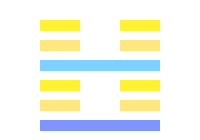
51.1.3.6 (51 > 56) - THE KĂN HEXAGRAM.
- 1. The first line, undivided, shows its subject, when the movement approaches, looking out and around with apprehension, and afterwards smiling and talking cheerfully. There will be good fortune.
- 3. The third line, divided, shows its subject distraught amid the startling movements going on. If those movements excite him to (right) action, there will be no mistake.
- 6. The topmost line, divided, shows its subject, amidst the startling movements (of the time), in breathless dismay and looking round him with trembling apprehension. If he take action, there will be evil. If, while the startling movements have not reached his own person and his neighbourhood, (he were to take precautions), there would be no error, though his relatives might (still) speak against him.
51.1.3.6 (51 > 56) - Shock
One loses one's pursuers by making them take another road.
Bing DeepL Google Yandex51.1.3.6 (51 > 56) - Shock
One loses one's pursuers by making them take another road.
Bing DeepL Google Yandex51.1.3.6 (51 > 56) - Kán, l’ébranlement
Kán : tonnerre, effroi répandu, crainte.
- 1. Le tonnerre approchant, on est plein d’effroi ; puis, quand il est passé, on sourit et on parle tous ensemble (on passe de la crainte à la joie).
- 3. Le tonnerre émeut, agite ; il pousse à agir justement.
-
6. Le tonnerre répand l’effroi et fait partout regarder avec trouble et crainte. S’il atteint et frappe, il causera un grand mal. (Ou : il corrige le mal.) Mais s’il ne frappe ni tel personnage, ni ses voisins, ce ne sera point un mal et fera seulement jaser les habitants d’une même maison.
Quand le tonnerre gronde, que l’orage éclate, le sage recherche la cause de ce fait (et tâche de profiter de l’avertissement céleste).
51.1.3.6 (51 > 56) - Le choc
On sème ses poursuivants en leur faisant prendre une autre route.
Bing DeepL Google Yandex51.1.3.6 (51 > 56) - Megrázkódtatás
- 1. Nevethet miután meglátja.
- 3. Meglátva a szakadást otthagyja őket.
- 6. Elvesztette a leggyengébbet, visszafogottnak kell maradnia míg nem változnak.
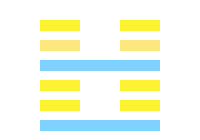
51.2.3.6 (51 > 14) - THE KĂN HEXAGRAM.
- 2. The second line, divided, shows its subject, when the movement approaches, in a position of peril. He judges it better to let go the articles (in his possession), and to ascend a very lofty height. There is no occasion for him to pursue after (the things he has let go) ; in seven days he will find them.
- 3. The third line, divided, shows its subject distraught amid the startling movements going on. If those movements excite him to (right) action, there will be no mistake.
- 6. The topmost line, divided, shows its subject, amidst the startling movements (of the time), in breathless dismay and looking round him with trembling apprehension. If he take action, there will be evil. If, while the startling movements have not reached his own person and his neighbourhood, (he were to take precautions), there would be no error, though his relatives might (still) speak against him.
51.2.3.6 (51 > 14) - Shock
One tries to understand why others have not yet arrived.
Bing DeepL Google Yandex51.2.3.6 (51 > 14) - Shock
One tries to understand why others have not yet arrived.
Bing DeepL Google Yandex51.2.3.6 (51 > 14) - Kán, l’ébranlement
Kán : tonnerre, effroi répandu, crainte.
- 2. Quand le tonnerre gronde, le danger arrive, on croit devoir tout abandonner et se retirer en un lieu sûr et élevé. Qu’on ne s’obstine pas à rechercher alors ce qu’on a abandonné ; on le retrouvera quelque temps après. (Quand le danger sera passé.)
- 3. Le tonnerre émeut, agite ; il pousse à agir justement.
-
6. Le tonnerre répand l’effroi et fait partout regarder avec trouble et crainte. S’il atteint et frappe, il causera un grand mal. (Ou : il corrige le mal.) Mais s’il ne frappe ni tel personnage, ni ses voisins, ce ne sera point un mal et fera seulement jaser les habitants d’une même maison.
Quand le tonnerre gronde, que l’orage éclate, le sage recherche la cause de ce fait (et tâche de profiter de l’avertissement céleste).
51.2.3.6 (51 > 14) - Le choc
On cherche à comprendre pourquoi les autres ne sont pas encore arrivés.
Bing DeepL Google Yandex51.2.3.6 (51 > 14) - Megrázkódtatás
- 2. Ne keresse ami elveszett.
- 3. Meglátva a szakadást otthagyja őket.
- 6. Elvesztette a leggyengébbet, visszafogottnak kell maradnia míg nem változnak.
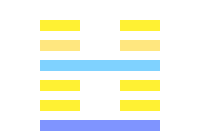
51.1.2.3.6 (51 > 50) - THE KĂN HEXAGRAM.
- 1. The first line, undivided, shows its subject, when the movement approaches, looking out and around with apprehension, and afterwards smiling and talking cheerfully. There will be good fortune.
- 2. The second line, divided, shows its subject, when the movement approaches, in a position of peril. He judges it better to let go the articles (in his possession), and to ascend a very lofty height. There is no occasion for him to pursue after (the things he has let go) ; in seven days he will find them.
- 3. The third line, divided, shows its subject distraught amid the startling movements going on. If those movements excite him to (right) action, there will be no mistake.
- 6. The topmost line, divided, shows its subject, amidst the startling movements (of the time), in breathless dismay and looking round him with trembling apprehension. If he take action, there will be evil. If, while the startling movements have not reached his own person and his neighbourhood, (he were to take precautions), there would be no error, though his relatives might (still) speak against him.
51.1.2.3.6 (51 > 50) - Shock
One is bustling around those who have planned to get carried away.
Bing DeepL Google Yandex51.1.2.3.6 (51 > 50) - Shock
One is bustling around those who have planned to get carried away.
Bing DeepL Google Yandex51.1.2.3.6 (51 > 50) - Kán, l’ébranlement
Kán : tonnerre, effroi répandu, crainte.
- 1. Le tonnerre approchant, on est plein d’effroi ; puis, quand il est passé, on sourit et on parle tous ensemble (on passe de la crainte à la joie).
- 2. Quand le tonnerre gronde, le danger arrive, on croit devoir tout abandonner et se retirer en un lieu sûr et élevé. Qu’on ne s’obstine pas à rechercher alors ce qu’on a abandonné ; on le retrouvera quelque temps après. (Quand le danger sera passé.)
- 3. Le tonnerre émeut, agite ; il pousse à agir justement.
-
6. Le tonnerre répand l’effroi et fait partout regarder avec trouble et crainte. S’il atteint et frappe, il causera un grand mal. (Ou : il corrige le mal.) Mais s’il ne frappe ni tel personnage, ni ses voisins, ce ne sera point un mal et fera seulement jaser les habitants d’une même maison.
Quand le tonnerre gronde, que l’orage éclate, le sage recherche la cause de ce fait (et tâche de profiter de l’avertissement céleste).
51.1.2.3.6 (51 > 50) - Le choc
On s'affaire autour de ceux qui ont prévu de se laisser emporter.
Bing DeepL Google Yandex51.1.2.3.6 (51 > 50) - Megrázkódtatás
- 1. Nevethet miután meglátja.
- 2. Ne keresse ami elveszett.
- 3. Meglátva a szakadást otthagyja őket.
- 6. Elvesztette a leggyengébbet, visszafogottnak kell maradnia míg nem változnak.
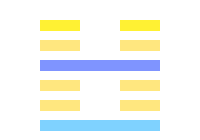
51.4.6 (51 > 27) - THE KĂN HEXAGRAM.
- 4. The fourth line, undivided, shows its subject, amid the startling movements, supinely sinking (deeper) in the mud.
- 6. The topmost line, divided, shows its subject, amidst the startling movements (of the time), in breathless dismay and looking round him with trembling apprehension. If he take action, there will be evil. If, while the startling movements have not reached his own person and his neighbourhood, (he were to take precautions), there would be no error, though his relatives might (still) speak against him.
51.4.6 (51 > 27) - Shock
One asks others what one cannot provide by oneself.
Bing DeepL Google Yandex51.4.6 (51 > 27) - Shock
One asks others what one cannot provide by oneself.
Bing DeepL Google Yandex51.4.6 (51 > 27) - Kán, l’ébranlement
Kán : tonnerre, effroi répandu, crainte.
- 4. Le tonnerre approchant trouble et interdit [avant même l’éclair].
-
6. Le tonnerre répand l’effroi et fait partout regarder avec trouble et crainte. S’il atteint et frappe, il causera un grand mal. (Ou : il corrige le mal.) Mais s’il ne frappe ni tel personnage, ni ses voisins, ce ne sera point un mal et fera seulement jaser les habitants d’une même maison.
Quand le tonnerre gronde, que l’orage éclate, le sage recherche la cause de ce fait (et tâche de profiter de l’avertissement céleste).
51.4.6 (51 > 27) - Le choc
On demande aux autres ce qu'on ne peut pas fournir soi-même.
Bing DeepL Google Yandex51.4.6 (51 > 27) - Megrázkódtatás
- 4. Meg kell szabadítania magát a többiektől mielőtt tovább mehetne.
- 6. Elvesztette a leggyengébbet, visszafogottnak kell maradnia míg nem változnak.
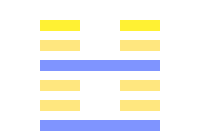
51.1.4.6 (51 > 23) - THE KĂN HEXAGRAM.
- 1. The first line, undivided, shows its subject, when the movement approaches, looking out and around with apprehension, and afterwards smiling and talking cheerfully. There will be good fortune.
- 4. The fourth line, undivided, shows its subject, amid the startling movements, supinely sinking (deeper) in the mud.
- 6. The topmost line, divided, shows its subject, amidst the startling movements (of the time), in breathless dismay and looking round him with trembling apprehension. If he take action, there will be evil. If, while the startling movements have not reached his own person and his neighbourhood, (he were to take precautions), there would be no error, though his relatives might (still) speak against him.
51.1.4.6 (51 > 23) - Shock
One consults the archives to find a lost document.
Bing DeepL Google Yandex51.1.4.6 (51 > 23) - Shock
One consults the archives to find a lost document.
Bing DeepL Google Yandex51.1.4.6 (51 > 23) - Kán, l’ébranlement
Kán : tonnerre, effroi répandu, crainte.
- 1. Le tonnerre approchant, on est plein d’effroi ; puis, quand il est passé, on sourit et on parle tous ensemble (on passe de la crainte à la joie).
- 4. Le tonnerre approchant trouble et interdit [avant même l’éclair].
-
6. Le tonnerre répand l’effroi et fait partout regarder avec trouble et crainte. S’il atteint et frappe, il causera un grand mal. (Ou : il corrige le mal.) Mais s’il ne frappe ni tel personnage, ni ses voisins, ce ne sera point un mal et fera seulement jaser les habitants d’une même maison.
Quand le tonnerre gronde, que l’orage éclate, le sage recherche la cause de ce fait (et tâche de profiter de l’avertissement céleste).
51.1.4.6 (51 > 23) - Le choc
On consulte les archives pour retrouver un document perdu.
Bing DeepL Google Yandex51.1.4.6 (51 > 23) - Megrázkódtatás
- 1. Nevethet miután meglátja.
- 4. Meg kell szabadítania magát a többiektől mielőtt tovább mehetne.
- 6. Elvesztette a leggyengébbet, visszafogottnak kell maradnia míg nem változnak.
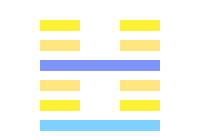
51.2.4.6 (51 > 41) - THE KĂN HEXAGRAM.
- 2. The second line, divided, shows its subject, when the movement approaches, in a position of peril. He judges it better to let go the articles (in his possession), and to ascend a very lofty height. There is no occasion for him to pursue after (the things he has let go) ; in seven days he will find them.
- 4. The fourth line, undivided, shows its subject, amid the startling movements, supinely sinking (deeper) in the mud.
- 6. The topmost line, divided, shows its subject, amidst the startling movements (of the time), in breathless dismay and looking round him with trembling apprehension. If he take action, there will be evil. If, while the startling movements have not reached his own person and his neighbourhood, (he were to take precautions), there would be no error, though his relatives might (still) speak against him.
51.2.4.6 (51 > 41) - Shock
One tries to catch the others off guard but they rejoice and respond in a scathing way.
Bing DeepL Google Yandex51.2.4.6 (51 > 41) - Shock
One tries to catch the others off guard but they rejoice and respond in a scathing way.
Bing DeepL Google Yandex51.2.4.6 (51 > 41) - Kán, l’ébranlement
Kán : tonnerre, effroi répandu, crainte.
- 2. Quand le tonnerre gronde, le danger arrive, on croit devoir tout abandonner et se retirer en un lieu sûr et élevé. Qu’on ne s’obstine pas à rechercher alors ce qu’on a abandonné ; on le retrouvera quelque temps après. (Quand le danger sera passé.)
- 4. Le tonnerre approchant trouble et interdit [avant même l’éclair].
-
6. Le tonnerre répand l’effroi et fait partout regarder avec trouble et crainte. S’il atteint et frappe, il causera un grand mal. (Ou : il corrige le mal.) Mais s’il ne frappe ni tel personnage, ni ses voisins, ce ne sera point un mal et fera seulement jaser les habitants d’une même maison.
Quand le tonnerre gronde, que l’orage éclate, le sage recherche la cause de ce fait (et tâche de profiter de l’avertissement céleste).
51.2.4.6 (51 > 41) - Le choc
On tente de prendre les autres de court mais ceux-ci se réjouissent et répliquent d'une façon cinglante.
Bing DeepL Google Yandex51.2.4.6 (51 > 41) - Megrázkódtatás
- 2. Ne keresse ami elveszett.
- 4. Meg kell szabadítania magát a többiektől mielőtt tovább mehetne.
- 6. Elvesztette a leggyengébbet, visszafogottnak kell maradnia míg nem változnak.
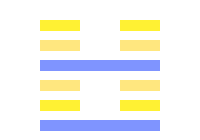
51.1.2.4.6 (51 > 4) - THE KĂN HEXAGRAM.
- 1. The first line, undivided, shows its subject, when the movement approaches, looking out and around with apprehension, and afterwards smiling and talking cheerfully. There will be good fortune.
- 2. The second line, divided, shows its subject, when the movement approaches, in a position of peril. He judges it better to let go the articles (in his possession), and to ascend a very lofty height. There is no occasion for him to pursue after (the things he has let go) ; in seven days he will find them.
- 4. The fourth line, undivided, shows its subject, amid the startling movements, supinely sinking (deeper) in the mud.
- 6. The topmost line, divided, shows its subject, amidst the startling movements (of the time), in breathless dismay and looking round him with trembling apprehension. If he take action, there will be evil. If, while the startling movements have not reached his own person and his neighbourhood, (he were to take precautions), there would be no error, though his relatives might (still) speak against him.
51.1.2.4.6 (51 > 4) - Kán, l’ébranlement
Kán : tonnerre, effroi répandu, crainte.
- 1. Le tonnerre approchant, on est plein d’effroi ; puis, quand il est passé, on sourit et on parle tous ensemble (on passe de la crainte à la joie).
- 2. Quand le tonnerre gronde, le danger arrive, on croit devoir tout abandonner et se retirer en un lieu sûr et élevé. Qu’on ne s’obstine pas à rechercher alors ce qu’on a abandonné ; on le retrouvera quelque temps après. (Quand le danger sera passé.)
- 4. Le tonnerre approchant trouble et interdit [avant même l’éclair].
-
6. Le tonnerre répand l’effroi et fait partout regarder avec trouble et crainte. S’il atteint et frappe, il causera un grand mal. (Ou : il corrige le mal.) Mais s’il ne frappe ni tel personnage, ni ses voisins, ce ne sera point un mal et fera seulement jaser les habitants d’une même maison.
Quand le tonnerre gronde, que l’orage éclate, le sage recherche la cause de ce fait (et tâche de profiter de l’avertissement céleste).
51.1.2.4.6 (51 > 4) - Megrázkódtatás
- 1. Nevethet miután meglátja.
- 2. Ne keresse ami elveszett.
- 4. Meg kell szabadítania magát a többiektől mielőtt tovább mehetne.
- 6. Elvesztette a leggyengébbet, visszafogottnak kell maradnia míg nem változnak.
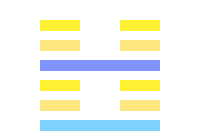
51.3.4.6 (51 > 22) - THE KĂN HEXAGRAM.
- 3. The third line, divided, shows its subject distraught amid the startling movements going on. If those movements excite him to (right) action, there will be no mistake.
- 4. The fourth line, undivided, shows its subject, amid the startling movements, supinely sinking (deeper) in the mud.
- 6. The topmost line, divided, shows its subject, amidst the startling movements (of the time), in breathless dismay and looking round him with trembling apprehension. If he take action, there will be evil. If, while the startling movements have not reached his own person and his neighbourhood, (he were to take precautions), there would be no error, though his relatives might (still) speak against him.
51.3.4.6 (51 > 22) - Shock
One weighs one' s words before making comments that can be humiliating for one' s interlocutors.
Bing DeepL Google Yandex51.3.4.6 (51 > 22) - Shock
One weighs one' s words before making comments that can be humiliating for one' s interlocutors.
Bing DeepL Google Yandex51.3.4.6 (51 > 22) - Kán, l’ébranlement
Kán : tonnerre, effroi répandu, crainte.
- 3. Le tonnerre émeut, agite ; il pousse à agir justement.
- 4. Le tonnerre approchant trouble et interdit [avant même l’éclair].
-
6. Le tonnerre répand l’effroi et fait partout regarder avec trouble et crainte. S’il atteint et frappe, il causera un grand mal. (Ou : il corrige le mal.) Mais s’il ne frappe ni tel personnage, ni ses voisins, ce ne sera point un mal et fera seulement jaser les habitants d’une même maison.
Quand le tonnerre gronde, que l’orage éclate, le sage recherche la cause de ce fait (et tâche de profiter de l’avertissement céleste).
51.3.4.6 (51 > 22) - Le choc
On pèse ses mots avant de tenir des propos qui peuvent être humiliants pour ses interlocuteurs.
Bing DeepL Google Yandex51.3.4.6 (51 > 22) - Megrázkódtatás
- 3. Meglátva a szakadást otthagyja őket.
- 4. Meg kell szabadítania magát a többiektől mielőtt tovább mehetne.
- 6. Elvesztette a leggyengébbet, visszafogottnak kell maradnia míg nem változnak.
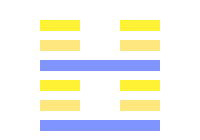
51.1.3.4.6 (51 > 52) - THE KĂN HEXAGRAM.
- 1. The first line, undivided, shows its subject, when the movement approaches, looking out and around with apprehension, and afterwards smiling and talking cheerfully. There will be good fortune.
- 3. The third line, divided, shows its subject distraught amid the startling movements going on. If those movements excite him to (right) action, there will be no mistake.
- 4. The fourth line, undivided, shows its subject, amid the startling movements, supinely sinking (deeper) in the mud.
- 6. The topmost line, divided, shows its subject, amidst the startling movements (of the time), in breathless dismay and looking round him with trembling apprehension. If he take action, there will be evil. If, while the startling movements have not reached his own person and his neighbourhood, (he were to take precautions), there would be no error, though his relatives might (still) speak against him.
51.1.3.4.6 (51 > 52) - Shock
One indulges in shenanigans so as not to be regarded as all and sundry.
Bing DeepL Google Yandex51.1.3.4.6 (51 > 52) - Shock
One indulges in shenanigans so as not to be regarded as all and sundry.
Bing DeepL Google Yandex51.1.3.4.6 (51 > 52) - Kán, l’ébranlement
Kán : tonnerre, effroi répandu, crainte.
- 1. Le tonnerre approchant, on est plein d’effroi ; puis, quand il est passé, on sourit et on parle tous ensemble (on passe de la crainte à la joie).
- 3. Le tonnerre émeut, agite ; il pousse à agir justement.
- 4. Le tonnerre approchant trouble et interdit [avant même l’éclair].
-
6. Le tonnerre répand l’effroi et fait partout regarder avec trouble et crainte. S’il atteint et frappe, il causera un grand mal. (Ou : il corrige le mal.) Mais s’il ne frappe ni tel personnage, ni ses voisins, ce ne sera point un mal et fera seulement jaser les habitants d’une même maison.
Quand le tonnerre gronde, que l’orage éclate, le sage recherche la cause de ce fait (et tâche de profiter de l’avertissement céleste).
51.1.3.4.6 (51 > 52) - Le choc
On se complaît à faire des frasques pour ne pas être considéré comme le tout-venant.
Bing DeepL Google Yandex51.1.3.4.6 (51 > 52) - Megrázkódtatás
- 1. Nevethet miután meglátja.
- 3. Meglátva a szakadást otthagyja őket.
- 4. Meg kell szabadítania magát a többiektől mielőtt tovább mehetne.
- 6. Elvesztette a leggyengébbet, visszafogottnak kell maradnia míg nem változnak.
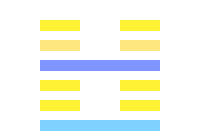
51.2.3.4.6 (51 > 26) - THE KĂN HEXAGRAM.
- 2. The second line, divided, shows its subject, when the movement approaches, in a position of peril. He judges it better to let go the articles (in his possession), and to ascend a very lofty height. There is no occasion for him to pursue after (the things he has let go) ; in seven days he will find them.
- 3. The third line, divided, shows its subject distraught amid the startling movements going on. If those movements excite him to (right) action, there will be no mistake.
- 4. The fourth line, undivided, shows its subject, amid the startling movements, supinely sinking (deeper) in the mud.
- 6. The topmost line, divided, shows its subject, amidst the startling movements (of the time), in breathless dismay and looking round him with trembling apprehension. If he take action, there will be evil. If, while the startling movements have not reached his own person and his neighbourhood, (he were to take precautions), there would be no error, though his relatives might (still) speak against him.
51.2.3.4.6 (51 > 26) - Shock
One tumbles preconceived ideas by ending one's sentences abruptly.
Bing DeepL Google Yandex51.2.3.4.6 (51 > 26) - Shock
One tumbles preconceived ideas by ending one's sentences abruptly.
Bing DeepL Google Yandex51.2.3.4.6 (51 > 26) - Kán, l’ébranlement
Kán : tonnerre, effroi répandu, crainte.
- 2. Quand le tonnerre gronde, le danger arrive, on croit devoir tout abandonner et se retirer en un lieu sûr et élevé. Qu’on ne s’obstine pas à rechercher alors ce qu’on a abandonné ; on le retrouvera quelque temps après. (Quand le danger sera passé.)
- 3. Le tonnerre émeut, agite ; il pousse à agir justement.
- 4. Le tonnerre approchant trouble et interdit [avant même l’éclair].
-
6. Le tonnerre répand l’effroi et fait partout regarder avec trouble et crainte. S’il atteint et frappe, il causera un grand mal. (Ou : il corrige le mal.) Mais s’il ne frappe ni tel personnage, ni ses voisins, ce ne sera point un mal et fera seulement jaser les habitants d’une même maison.
Quand le tonnerre gronde, que l’orage éclate, le sage recherche la cause de ce fait (et tâche de profiter de l’avertissement céleste).
51.2.3.4.6 (51 > 26) - Le choc
On culbute les idées préconçues en terminant ses phrases de façon abrupte.
Bing DeepL Google Yandex51.2.3.4.6 (51 > 26) - Megrázkódtatás
- 2. Ne keresse ami elveszett.
- 3. Meglátva a szakadást otthagyja őket.
- 4. Meg kell szabadítania magát a többiektől mielőtt tovább mehetne.
- 6. Elvesztette a leggyengébbet, visszafogottnak kell maradnia míg nem változnak.
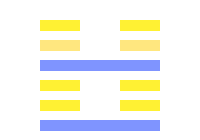
51.1.2.3.4.6 (51 > 18) - THE KĂN HEXAGRAM.
- 1. The first line, undivided, shows its subject, when the movement approaches, looking out and around with apprehension, and afterwards smiling and talking cheerfully. There will be good fortune.
- 2. The second line, divided, shows its subject, when the movement approaches, in a position of peril. He judges it better to let go the articles (in his possession), and to ascend a very lofty height. There is no occasion for him to pursue after (the things he has let go) ; in seven days he will find them.
- 3. The third line, divided, shows its subject distraught amid the startling movements going on. If those movements excite him to (right) action, there will be no mistake.
- 4. The fourth line, undivided, shows its subject, amid the startling movements, supinely sinking (deeper) in the mud.
- 6. The topmost line, divided, shows its subject, amidst the startling movements (of the time), in breathless dismay and looking round him with trembling apprehension. If he take action, there will be evil. If, while the startling movements have not reached his own person and his neighbourhood, (he were to take precautions), there would be no error, though his relatives might (still) speak against him.
51.1.2.3.4.6 (51 > 18) - Shock
One extends one's study to related fields in order to understand how the whole thing works.
Bing DeepL Google Yandex51.1.2.3.4.6 (51 > 18) - Shock
One extends one's study to related fields in order to understand how the whole thing works.
Bing DeepL Google Yandex51.1.2.3.4.6 (51 > 18) - Kán, l’ébranlement
Kán : tonnerre, effroi répandu, crainte.
- 1. Le tonnerre approchant, on est plein d’effroi ; puis, quand il est passé, on sourit et on parle tous ensemble (on passe de la crainte à la joie).
- 2. Quand le tonnerre gronde, le danger arrive, on croit devoir tout abandonner et se retirer en un lieu sûr et élevé. Qu’on ne s’obstine pas à rechercher alors ce qu’on a abandonné ; on le retrouvera quelque temps après. (Quand le danger sera passé.)
- 3. Le tonnerre émeut, agite ; il pousse à agir justement.
- 4. Le tonnerre approchant trouble et interdit [avant même l’éclair].
-
6. Le tonnerre répand l’effroi et fait partout regarder avec trouble et crainte. S’il atteint et frappe, il causera un grand mal. (Ou : il corrige le mal.) Mais s’il ne frappe ni tel personnage, ni ses voisins, ce ne sera point un mal et fera seulement jaser les habitants d’une même maison.
Quand le tonnerre gronde, que l’orage éclate, le sage recherche la cause de ce fait (et tâche de profiter de l’avertissement céleste).
51.1.2.3.4.6 (51 > 18) - Le choc
On étend son étude à des domaines connexes afin de parvenir à comprendre le fonctionnement de l'ensemble.
Bing DeepL Google Yandex51.1.2.3.4.6 (51 > 18) - Megrázkódtatás
- 1. Nevethet miután meglátja.
- 2. Ne keresse ami elveszett.
- 3. Meglátva a szakadást otthagyja őket.
- 4. Meg kell szabadítania magát a többiektől mielőtt tovább mehetne.
- 6. Elvesztette a leggyengébbet, visszafogottnak kell maradnia míg nem változnak.
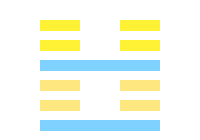
51.5.6 (51 > 25) - THE KĂN HEXAGRAM.
- 5. The fifth line, divided, shows its subject going and coming amidst the startling movements (of the time), and always in peril ; but perhaps he will not incur loss, and find business (which he can accomplish).
- 6. The topmost line, divided, shows its subject, amidst the startling movements (of the time), in breathless dismay and looking round him with trembling apprehension. If he take action, there will be evil. If, while the startling movements have not reached his own person and his neighbourhood, (he were to take precautions), there would be no error, though his relatives might (still) speak against him.
51.5.6 (51 > 25) - Shock
One respects one's guests without being used as a house servant.
Bing DeepL Google Yandex51.5.6 (51 > 25) - Shock
One respects one's guests without being used as a house servant.
Bing DeepL Google Yandex51.5.6 (51 > 25) - Kán, l’ébranlement
Kán : tonnerre, effroi répandu, crainte.
- 5. Le tonnerre allant et venant répand l’effroi ; mais on doit tâcher de ne pas abandonner les affaires entreprises. Même dans le danger pressant, on doit garder le milieu.
-
6. Le tonnerre répand l’effroi et fait partout regarder avec trouble et crainte. S’il atteint et frappe, il causera un grand mal. (Ou : il corrige le mal.) Mais s’il ne frappe ni tel personnage, ni ses voisins, ce ne sera point un mal et fera seulement jaser les habitants d’une même maison.
Quand le tonnerre gronde, que l’orage éclate, le sage recherche la cause de ce fait (et tâche de profiter de l’avertissement céleste).
51.5.6 (51 > 25) - Le choc
On respecte ses invités sans pour autant leur servir de personne à tout faire.
Bing DeepL Google Yandex51.5.6 (51 > 25) - Megrázkódtatás
- 5. Szilárdan áll a megrázkódtatás kezdetekor és végigkíséri a többieket míg véget nem ér.
- 6. Elvesztette a leggyengébbet, visszafogottnak kell maradnia míg nem változnak.
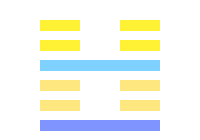
51.1.5.6 (51 > 12) - THE KĂN HEXAGRAM.
- 1. The first line, undivided, shows its subject, when the movement approaches, looking out and around with apprehension, and afterwards smiling and talking cheerfully. There will be good fortune.
- 5. The fifth line, divided, shows its subject going and coming amidst the startling movements (of the time), and always in peril ; but perhaps he will not incur loss, and find business (which he can accomplish).
- 6. The topmost line, divided, shows its subject, amidst the startling movements (of the time), in breathless dismay and looking round him with trembling apprehension. If he take action, there will be evil. If, while the startling movements have not reached his own person and his neighbourhood, (he were to take precautions), there would be no error, though his relatives might (still) speak against him.
51.1.5.6 (51 > 12) - Kán, l’ébranlement
Kán : tonnerre, effroi répandu, crainte.
- 1. Le tonnerre approchant, on est plein d’effroi ; puis, quand il est passé, on sourit et on parle tous ensemble (on passe de la crainte à la joie).
- 5. Le tonnerre allant et venant répand l’effroi ; mais on doit tâcher de ne pas abandonner les affaires entreprises. Même dans le danger pressant, on doit garder le milieu.
-
6. Le tonnerre répand l’effroi et fait partout regarder avec trouble et crainte. S’il atteint et frappe, il causera un grand mal. (Ou : il corrige le mal.) Mais s’il ne frappe ni tel personnage, ni ses voisins, ce ne sera point un mal et fera seulement jaser les habitants d’une même maison.
Quand le tonnerre gronde, que l’orage éclate, le sage recherche la cause de ce fait (et tâche de profiter de l’avertissement céleste).
51.1.5.6 (51 > 12) - Megrázkódtatás
- 1. Nevethet miután meglátja.
- 5. Szilárdan áll a megrázkódtatás kezdetekor és végigkíséri a többieket míg véget nem ér.
- 6. Elvesztette a leggyengébbet, visszafogottnak kell maradnia míg nem változnak.
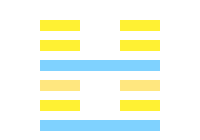
51.2.5.6 (51 > 10) - THE KĂN HEXAGRAM.
- 2. The second line, divided, shows its subject, when the movement approaches, in a position of peril. He judges it better to let go the articles (in his possession), and to ascend a very lofty height. There is no occasion for him to pursue after (the things he has let go) ; in seven days he will find them.
- 5. The fifth line, divided, shows its subject going and coming amidst the startling movements (of the time), and always in peril ; but perhaps he will not incur loss, and find business (which he can accomplish).
- 6. The topmost line, divided, shows its subject, amidst the startling movements (of the time), in breathless dismay and looking round him with trembling apprehension. If he take action, there will be evil. If, while the startling movements have not reached his own person and his neighbourhood, (he were to take precautions), there would be no error, though his relatives might (still) speak against him.
51.2.5.6 (51 > 10) - Shock
One takes leave of those with whom one has shared suffering.
Bing DeepL Google Yandex51.2.5.6 (51 > 10) - Shock
One takes leave of those with whom one has shared suffering.
Bing DeepL Google Yandex51.2.5.6 (51 > 10) - Kán, l’ébranlement
Kán : tonnerre, effroi répandu, crainte.
- 2. Quand le tonnerre gronde, le danger arrive, on croit devoir tout abandonner et se retirer en un lieu sûr et élevé. Qu’on ne s’obstine pas à rechercher alors ce qu’on a abandonné ; on le retrouvera quelque temps après. (Quand le danger sera passé.)
- 5. Le tonnerre allant et venant répand l’effroi ; mais on doit tâcher de ne pas abandonner les affaires entreprises. Même dans le danger pressant, on doit garder le milieu.
-
6. Le tonnerre répand l’effroi et fait partout regarder avec trouble et crainte. S’il atteint et frappe, il causera un grand mal. (Ou : il corrige le mal.) Mais s’il ne frappe ni tel personnage, ni ses voisins, ce ne sera point un mal et fera seulement jaser les habitants d’une même maison.
Quand le tonnerre gronde, que l’orage éclate, le sage recherche la cause de ce fait (et tâche de profiter de l’avertissement céleste).
51.2.5.6 (51 > 10) - Le choc
On prend congé de ceux avec qui on a partagé des souffrances.
Bing DeepL Google Yandex51.2.5.6 (51 > 10) - Megrázkódtatás
- 2. Ne keresse ami elveszett.
- 5. Szilárdan áll a megrázkódtatás kezdetekor és végigkíséri a többieket míg véget nem ér.
- 6. Elvesztette a leggyengébbet, visszafogottnak kell maradnia míg nem változnak.
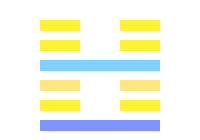
51.1.2.5.6 (51 > 6) - THE KĂN HEXAGRAM.
- 1. The first line, undivided, shows its subject, when the movement approaches, looking out and around with apprehension, and afterwards smiling and talking cheerfully. There will be good fortune.
- 2. The second line, divided, shows its subject, when the movement approaches, in a position of peril. He judges it better to let go the articles (in his possession), and to ascend a very lofty height. There is no occasion for him to pursue after (the things he has let go) ; in seven days he will find them.
- 5. The fifth line, divided, shows its subject going and coming amidst the startling movements (of the time), and always in peril ; but perhaps he will not incur loss, and find business (which he can accomplish).
- 6. The topmost line, divided, shows its subject, amidst the startling movements (of the time), in breathless dismay and looking round him with trembling apprehension. If he take action, there will be evil. If, while the startling movements have not reached his own person and his neighbourhood, (he were to take precautions), there would be no error, though his relatives might (still) speak against him.
51.1.2.5.6 (51 > 6) - Shock
One holds back one's allies to make them understand that they must not go any further.
Bing DeepL Google Yandex51.1.2.5.6 (51 > 6) - Shock
One holds back one's allies to make them understand that they must not go any further.
Bing DeepL Google Yandex51.1.2.5.6 (51 > 6) - Kán, l’ébranlement
Kán : tonnerre, effroi répandu, crainte.
- 1. Le tonnerre approchant, on est plein d’effroi ; puis, quand il est passé, on sourit et on parle tous ensemble (on passe de la crainte à la joie).
- 2. Quand le tonnerre gronde, le danger arrive, on croit devoir tout abandonner et se retirer en un lieu sûr et élevé. Qu’on ne s’obstine pas à rechercher alors ce qu’on a abandonné ; on le retrouvera quelque temps après. (Quand le danger sera passé.)
- 5. Le tonnerre allant et venant répand l’effroi ; mais on doit tâcher de ne pas abandonner les affaires entreprises. Même dans le danger pressant, on doit garder le milieu.
-
6. Le tonnerre répand l’effroi et fait partout regarder avec trouble et crainte. S’il atteint et frappe, il causera un grand mal. (Ou : il corrige le mal.) Mais s’il ne frappe ni tel personnage, ni ses voisins, ce ne sera point un mal et fera seulement jaser les habitants d’une même maison.
Quand le tonnerre gronde, que l’orage éclate, le sage recherche la cause de ce fait (et tâche de profiter de l’avertissement céleste).
51.1.2.5.6 (51 > 6) - Le choc
On retient ses alliés pour leur faire comprendre qu'ils ne doivent pas aller plus loin.
Bing DeepL Google Yandex51.1.2.5.6 (51 > 6) - Megrázkódtatás
- 1. Nevethet miután meglátja.
- 2. Ne keresse ami elveszett.
- 5. Szilárdan áll a megrázkódtatás kezdetekor és végigkíséri a többieket míg véget nem ér.
- 6. Elvesztette a leggyengébbet, visszafogottnak kell maradnia míg nem változnak.
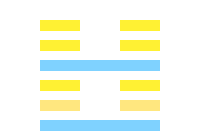
51.3.5.6 (51 > 13) - THE KĂN HEXAGRAM.
- 3. The third line, divided, shows its subject distraught amid the startling movements going on. If those movements excite him to (right) action, there will be no mistake.
- 5. The fifth line, divided, shows its subject going and coming amidst the startling movements (of the time), and always in peril ; but perhaps he will not incur loss, and find business (which he can accomplish).
- 6. The topmost line, divided, shows its subject, amidst the startling movements (of the time), in breathless dismay and looking round him with trembling apprehension. If he take action, there will be evil. If, while the startling movements have not reached his own person and his neighbourhood, (he were to take precautions), there would be no error, though his relatives might (still) speak against him.
51.3.5.6 (51 > 13) - Shock
One challenges the reality of the facts that others claimed to have experienced.
Bing DeepL Google Yandex51.3.5.6 (51 > 13) - Shock
One challenges the reality of the facts that others claimed to have experienced.
Bing DeepL Google Yandex51.3.5.6 (51 > 13) - Kán, l’ébranlement
Kán : tonnerre, effroi répandu, crainte.
- 3. Le tonnerre émeut, agite ; il pousse à agir justement.
- 5. Le tonnerre allant et venant répand l’effroi ; mais on doit tâcher de ne pas abandonner les affaires entreprises. Même dans le danger pressant, on doit garder le milieu.
-
6. Le tonnerre répand l’effroi et fait partout regarder avec trouble et crainte. S’il atteint et frappe, il causera un grand mal. (Ou : il corrige le mal.) Mais s’il ne frappe ni tel personnage, ni ses voisins, ce ne sera point un mal et fera seulement jaser les habitants d’une même maison.
Quand le tonnerre gronde, que l’orage éclate, le sage recherche la cause de ce fait (et tâche de profiter de l’avertissement céleste).
51.3.5.6 (51 > 13) - Le choc
On conteste la réalité des faits que les autres ont prétendu avoir vécu.
Bing DeepL Google Yandex51.3.5.6 (51 > 13) - Megrázkódtatás
- 3. Meglátva a szakadást otthagyja őket.
- 5. Szilárdan áll a megrázkódtatás kezdetekor és végigkíséri a többieket míg véget nem ér.
- 6. Elvesztette a leggyengébbet, visszafogottnak kell maradnia míg nem változnak.
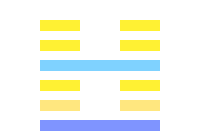
51.1.3.5.6 (51 > 33) - THE KĂN HEXAGRAM.
- 1. The first line, undivided, shows its subject, when the movement approaches, looking out and around with apprehension, and afterwards smiling and talking cheerfully. There will be good fortune.
- 3. The third line, divided, shows its subject distraught amid the startling movements going on. If those movements excite him to (right) action, there will be no mistake.
- 5. The fifth line, divided, shows its subject going and coming amidst the startling movements (of the time), and always in peril ; but perhaps he will not incur loss, and find business (which he can accomplish).
- 6. The topmost line, divided, shows its subject, amidst the startling movements (of the time), in breathless dismay and looking round him with trembling apprehension. If he take action, there will be evil. If, while the startling movements have not reached his own person and his neighbourhood, (he were to take precautions), there would be no error, though his relatives might (still) speak against him.
51.1.3.5.6 (51 > 33) - Shock
One criticizes with great passion the opponents of those one protects.
Bing DeepL Google Yandex51.1.3.5.6 (51 > 33) - Shock
One criticizes with great passion the opponents of those one protects.
Bing DeepL Google Yandex51.1.3.5.6 (51 > 33) - Kán, l’ébranlement
Kán : tonnerre, effroi répandu, crainte.
- 1. Le tonnerre approchant, on est plein d’effroi ; puis, quand il est passé, on sourit et on parle tous ensemble (on passe de la crainte à la joie).
- 3. Le tonnerre émeut, agite ; il pousse à agir justement.
- 5. Le tonnerre allant et venant répand l’effroi ; mais on doit tâcher de ne pas abandonner les affaires entreprises. Même dans le danger pressant, on doit garder le milieu.
-
6. Le tonnerre répand l’effroi et fait partout regarder avec trouble et crainte. S’il atteint et frappe, il causera un grand mal. (Ou : il corrige le mal.) Mais s’il ne frappe ni tel personnage, ni ses voisins, ce ne sera point un mal et fera seulement jaser les habitants d’une même maison.
Quand le tonnerre gronde, que l’orage éclate, le sage recherche la cause de ce fait (et tâche de profiter de l’avertissement céleste).
51.1.3.5.6 (51 > 33) - Le choc
On critique avec ferveur les adversaires de ceux qu'on protège.
Bing DeepL Google Yandex51.1.3.5.6 (51 > 33) - Megrázkódtatás
- 1. Nevethet miután meglátja.
- 3. Meglátva a szakadást otthagyja őket.
- 5. Szilárdan áll a megrázkódtatás kezdetekor és végigkíséri a többieket míg véget nem ér.
- 6. Elvesztette a leggyengébbet, visszafogottnak kell maradnia míg nem változnak.
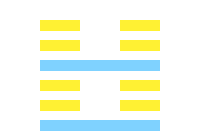
51.2.3.5.6 (51 > 1) - THE KĂN HEXAGRAM.
- 2. The second line, divided, shows its subject, when the movement approaches, in a position of peril. He judges it better to let go the articles (in his possession), and to ascend a very lofty height. There is no occasion for him to pursue after (the things he has let go) ; in seven days he will find them.
- 3. The third line, divided, shows its subject distraught amid the startling movements going on. If those movements excite him to (right) action, there will be no mistake.
- 5. The fifth line, divided, shows its subject going and coming amidst the startling movements (of the time), and always in peril ; but perhaps he will not incur loss, and find business (which he can accomplish).
- 6. The topmost line, divided, shows its subject, amidst the startling movements (of the time), in breathless dismay and looking round him with trembling apprehension. If he take action, there will be evil. If, while the startling movements have not reached his own person and his neighbourhood, (he were to take precautions), there would be no error, though his relatives might (still) speak against him.
51.2.3.5.6 (51 > 1) - Shock
One raises a point to which everybody will agree upon.
Bing DeepL Google Yandex51.2.3.5.6 (51 > 1) - Shock
One raises a point to which everybody will agree upon.
Bing DeepL Google Yandex51.2.3.5.6 (51 > 1) - Kán, l’ébranlement
Kán : tonnerre, effroi répandu, crainte.
- 2. Quand le tonnerre gronde, le danger arrive, on croit devoir tout abandonner et se retirer en un lieu sûr et élevé. Qu’on ne s’obstine pas à rechercher alors ce qu’on a abandonné ; on le retrouvera quelque temps après. (Quand le danger sera passé.)
- 3. Le tonnerre émeut, agite ; il pousse à agir justement.
- 5. Le tonnerre allant et venant répand l’effroi ; mais on doit tâcher de ne pas abandonner les affaires entreprises. Même dans le danger pressant, on doit garder le milieu.
-
6. Le tonnerre répand l’effroi et fait partout regarder avec trouble et crainte. S’il atteint et frappe, il causera un grand mal. (Ou : il corrige le mal.) Mais s’il ne frappe ni tel personnage, ni ses voisins, ce ne sera point un mal et fera seulement jaser les habitants d’une même maison.
Quand le tonnerre gronde, que l’orage éclate, le sage recherche la cause de ce fait (et tâche de profiter de l’avertissement céleste).
51.2.3.5.6 (51 > 1) - Megrázkódtatás
- 2. Ne keresse ami elveszett.
- 3. Meglátva a szakadást otthagyja őket.
- 5. Szilárdan áll a megrázkódtatás kezdetekor és végigkíséri a többieket míg véget nem ér.
- 6. Elvesztette a leggyengébbet, visszafogottnak kell maradnia míg nem változnak.
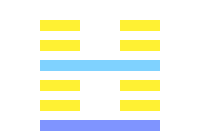
51.1.2.3.5.6 (51 > 44) - THE KĂN HEXAGRAM.
- 1. The first line, undivided, shows its subject, when the movement approaches, looking out and around with apprehension, and afterwards smiling and talking cheerfully. There will be good fortune.
- 2. The second line, divided, shows its subject, when the movement approaches, in a position of peril. He judges it better to let go the articles (in his possession), and to ascend a very lofty height. There is no occasion for him to pursue after (the things he has let go) ; in seven days he will find them.
- 3. The third line, divided, shows its subject distraught amid the startling movements going on. If those movements excite him to (right) action, there will be no mistake.
- 5. The fifth line, divided, shows its subject going and coming amidst the startling movements (of the time), and always in peril ; but perhaps he will not incur loss, and find business (which he can accomplish).
- 6. The topmost line, divided, shows its subject, amidst the startling movements (of the time), in breathless dismay and looking round him with trembling apprehension. If he take action, there will be evil. If, while the startling movements have not reached his own person and his neighbourhood, (he were to take precautions), there would be no error, though his relatives might (still) speak against him.
51.1.2.3.5.6 (51 > 44) - Shock
One is still allowed to compete because the judges have chosen to be reckless.
Bing DeepL Google Yandex51.1.2.3.5.6 (51 > 44) - Shock
One is still allowed to compete because the judges have chosen to be reckless.
Bing DeepL Google Yandex51.1.2.3.5.6 (51 > 44) - Kán, l’ébranlement
Kán : tonnerre, effroi répandu, crainte.
- 1. Le tonnerre approchant, on est plein d’effroi ; puis, quand il est passé, on sourit et on parle tous ensemble (on passe de la crainte à la joie).
- 2. Quand le tonnerre gronde, le danger arrive, on croit devoir tout abandonner et se retirer en un lieu sûr et élevé. Qu’on ne s’obstine pas à rechercher alors ce qu’on a abandonné ; on le retrouvera quelque temps après. (Quand le danger sera passé.)
- 3. Le tonnerre émeut, agite ; il pousse à agir justement.
- 5. Le tonnerre allant et venant répand l’effroi ; mais on doit tâcher de ne pas abandonner les affaires entreprises. Même dans le danger pressant, on doit garder le milieu.
-
6. Le tonnerre répand l’effroi et fait partout regarder avec trouble et crainte. S’il atteint et frappe, il causera un grand mal. (Ou : il corrige le mal.) Mais s’il ne frappe ni tel personnage, ni ses voisins, ce ne sera point un mal et fera seulement jaser les habitants d’une même maison.
Quand le tonnerre gronde, que l’orage éclate, le sage recherche la cause de ce fait (et tâche de profiter de l’avertissement céleste).
51.1.2.3.5.6 (51 > 44) - Le choc
On est quand même admis à concourir car les juges ont choisi d'être insouciants.
Bing DeepL Google Yandex51.1.2.3.5.6 (51 > 44) - Megrázkódtatás
- 1. Nevethet miután meglátja.
- 2. Ne keresse ami elveszett.
- 3. Meglátva a szakadást otthagyja őket.
- 5. Szilárdan áll a megrázkódtatás kezdetekor és végigkíséri a többieket míg véget nem ér.
- 6. Elvesztette a leggyengébbet, visszafogottnak kell maradnia míg nem változnak.
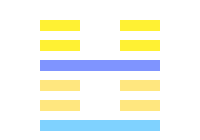
51.4.5.6 (51 > 42) - THE KĂN HEXAGRAM.
- 4. The fourth line, undivided, shows its subject, amid the startling movements, supinely sinking (deeper) in the mud.
- 5. The fifth line, divided, shows its subject going and coming amidst the startling movements (of the time), and always in peril ; but perhaps he will not incur loss, and find business (which he can accomplish).
- 6. The topmost line, divided, shows its subject, amidst the startling movements (of the time), in breathless dismay and looking round him with trembling apprehension. If he take action, there will be evil. If, while the startling movements have not reached his own person and his neighbourhood, (he were to take precautions), there would be no error, though his relatives might (still) speak against him.
51.4.5.6 (51 > 42) - Shock
One complicates the situation to keep the audience on their toes.
Bing DeepL Google Yandex51.4.5.6 (51 > 42) - Shock
One complicates the situation to keep the audience on their toes.
Bing DeepL Google Yandex51.4.5.6 (51 > 42) - Kán, l’ébranlement
Kán : tonnerre, effroi répandu, crainte.
- 4. Le tonnerre approchant trouble et interdit [avant même l’éclair].
- 5. Le tonnerre allant et venant répand l’effroi ; mais on doit tâcher de ne pas abandonner les affaires entreprises. Même dans le danger pressant, on doit garder le milieu.
-
6. Le tonnerre répand l’effroi et fait partout regarder avec trouble et crainte. S’il atteint et frappe, il causera un grand mal. (Ou : il corrige le mal.) Mais s’il ne frappe ni tel personnage, ni ses voisins, ce ne sera point un mal et fera seulement jaser les habitants d’une même maison.
Quand le tonnerre gronde, que l’orage éclate, le sage recherche la cause de ce fait (et tâche de profiter de l’avertissement céleste).
51.4.5.6 (51 > 42) - Le choc
On complique la situation pour tenir son public en haleine.
Bing DeepL Google Yandex51.4.5.6 (51 > 42) - Megrázkódtatás
- 4. Meg kell szabadítania magát a többiektől mielőtt tovább mehetne.
- 5. Szilárdan áll a megrázkódtatás kezdetekor és végigkíséri a többieket míg véget nem ér.
- 6. Elvesztette a leggyengébbet, visszafogottnak kell maradnia míg nem változnak.
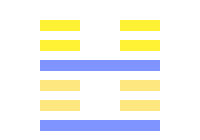
51.1.4.5.6 (51 > 20) - THE KĂN HEXAGRAM.
- 1. The first line, undivided, shows its subject, when the movement approaches, looking out and around with apprehension, and afterwards smiling and talking cheerfully. There will be good fortune.
- 4. The fourth line, undivided, shows its subject, amid the startling movements, supinely sinking (deeper) in the mud.
- 5. The fifth line, divided, shows its subject going and coming amidst the startling movements (of the time), and always in peril ; but perhaps he will not incur loss, and find business (which he can accomplish).
- 6. The topmost line, divided, shows its subject, amidst the startling movements (of the time), in breathless dismay and looking round him with trembling apprehension. If he take action, there will be evil. If, while the startling movements have not reached his own person and his neighbourhood, (he were to take precautions), there would be no error, though his relatives might (still) speak against him.
51.1.4.5.6 (51 > 20) - Shock
One imagines seeing things that others cannot understand.
Bing DeepL Google Yandex51.1.4.5.6 (51 > 20) - Shock
One imagines seeing things that others cannot understand.
Bing DeepL Google Yandex51.1.4.5.6 (51 > 20) - Kán, l’ébranlement
Kán : tonnerre, effroi répandu, crainte.
- 1. Le tonnerre approchant, on est plein d’effroi ; puis, quand il est passé, on sourit et on parle tous ensemble (on passe de la crainte à la joie).
- 4. Le tonnerre approchant trouble et interdit [avant même l’éclair].
- 5. Le tonnerre allant et venant répand l’effroi ; mais on doit tâcher de ne pas abandonner les affaires entreprises. Même dans le danger pressant, on doit garder le milieu.
-
6. Le tonnerre répand l’effroi et fait partout regarder avec trouble et crainte. S’il atteint et frappe, il causera un grand mal. (Ou : il corrige le mal.) Mais s’il ne frappe ni tel personnage, ni ses voisins, ce ne sera point un mal et fera seulement jaser les habitants d’une même maison.
Quand le tonnerre gronde, que l’orage éclate, le sage recherche la cause de ce fait (et tâche de profiter de l’avertissement céleste).
51.1.4.5.6 (51 > 20) - Le choc
On imagine voir des choses que les autres ne peuvent pas comprendre.
Bing DeepL Google Yandex51.1.4.5.6 (51 > 20) - Megrázkódtatás
- 1. Nevethet miután meglátja.
- 4. Meg kell szabadítania magát a többiektől mielőtt tovább mehetne.
- 5. Szilárdan áll a megrázkódtatás kezdetekor és végigkíséri a többieket míg véget nem ér.
- 6. Elvesztette a leggyengébbet, visszafogottnak kell maradnia míg nem változnak.
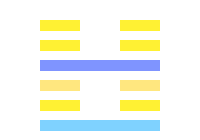
51.2.4.5.6 (51 > 61) - THE KĂN HEXAGRAM.
- 2. The second line, divided, shows its subject, when the movement approaches, in a position of peril. He judges it better to let go the articles (in his possession), and to ascend a very lofty height. There is no occasion for him to pursue after (the things he has let go) ; in seven days he will find them.
- 4. The fourth line, undivided, shows its subject, amid the startling movements, supinely sinking (deeper) in the mud.
- 5. The fifth line, divided, shows its subject going and coming amidst the startling movements (of the time), and always in peril ; but perhaps he will not incur loss, and find business (which he can accomplish).
- 6. The topmost line, divided, shows its subject, amidst the startling movements (of the time), in breathless dismay and looking round him with trembling apprehension. If he take action, there will be evil. If, while the startling movements have not reached his own person and his neighbourhood, (he were to take precautions), there would be no error, though his relatives might (still) speak against him.
51.2.4.5.6 (51 > 61) - Shock
One says that others have never had the slightest opportunity to do what one came for.
Bing DeepL Google Yandex51.2.4.5.6 (51 > 61) - Shock
One says that others have never had the slightest opportunity to do what one came for.
Bing DeepL Google Yandex51.2.4.5.6 (51 > 61) - Kán, l’ébranlement
Kán : tonnerre, effroi répandu, crainte.
- 2. Quand le tonnerre gronde, le danger arrive, on croit devoir tout abandonner et se retirer en un lieu sûr et élevé. Qu’on ne s’obstine pas à rechercher alors ce qu’on a abandonné ; on le retrouvera quelque temps après. (Quand le danger sera passé.)
- 4. Le tonnerre approchant trouble et interdit [avant même l’éclair].
- 5. Le tonnerre allant et venant répand l’effroi ; mais on doit tâcher de ne pas abandonner les affaires entreprises. Même dans le danger pressant, on doit garder le milieu.
-
6. Le tonnerre répand l’effroi et fait partout regarder avec trouble et crainte. S’il atteint et frappe, il causera un grand mal. (Ou : il corrige le mal.) Mais s’il ne frappe ni tel personnage, ni ses voisins, ce ne sera point un mal et fera seulement jaser les habitants d’une même maison.
Quand le tonnerre gronde, que l’orage éclate, le sage recherche la cause de ce fait (et tâche de profiter de l’avertissement céleste).
51.2.4.5.6 (51 > 61) - Le choc
On raconte que les autres n'ont jamais eu la moindre occasion de faire ce pour quoi on est venu.
Bing DeepL Google Yandex51.2.4.5.6 (51 > 61) - Megrázkódtatás
- 2. Ne keresse ami elveszett.
- 4. Meg kell szabadítania magát a többiektől mielőtt tovább mehetne.
- 5. Szilárdan áll a megrázkódtatás kezdetekor és végigkíséri a többieket míg véget nem ér.
- 6. Elvesztette a leggyengébbet, visszafogottnak kell maradnia míg nem változnak.
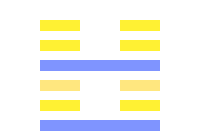
51.1.2.4.5.6 (51 > 59) - THE KĂN HEXAGRAM.
- 1. The first line, undivided, shows its subject, when the movement approaches, looking out and around with apprehension, and afterwards smiling and talking cheerfully. There will be good fortune.
- 2. The second line, divided, shows its subject, when the movement approaches, in a position of peril. He judges it better to let go the articles (in his possession), and to ascend a very lofty height. There is no occasion for him to pursue after (the things he has let go) ; in seven days he will find them.
- 4. The fourth line, undivided, shows its subject, amid the startling movements, supinely sinking (deeper) in the mud.
- 5. The fifth line, divided, shows its subject going and coming amidst the startling movements (of the time), and always in peril ; but perhaps he will not incur loss, and find business (which he can accomplish).
- 6. The topmost line, divided, shows its subject, amidst the startling movements (of the time), in breathless dismay and looking round him with trembling apprehension. If he take action, there will be evil. If, while the startling movements have not reached his own person and his neighbourhood, (he were to take precautions), there would be no error, though his relatives might (still) speak against him.
51.1.2.4.5.6 (51 > 59) - Shock
One carefully weighs the chances of being able to reach one's goal without any resistance.
Bing DeepL Google Yandex51.1.2.4.5.6 (51 > 59) - Shock
One carefully weighs the chances of being able to reach one's goal without any resistance.
Bing DeepL Google Yandex51.1.2.4.5.6 (51 > 59) - Kán, l’ébranlement
Kán : tonnerre, effroi répandu, crainte.
- 1. Le tonnerre approchant, on est plein d’effroi ; puis, quand il est passé, on sourit et on parle tous ensemble (on passe de la crainte à la joie).
- 2. Quand le tonnerre gronde, le danger arrive, on croit devoir tout abandonner et se retirer en un lieu sûr et élevé. Qu’on ne s’obstine pas à rechercher alors ce qu’on a abandonné ; on le retrouvera quelque temps après. (Quand le danger sera passé.)
- 4. Le tonnerre approchant trouble et interdit [avant même l’éclair].
- 5. Le tonnerre allant et venant répand l’effroi ; mais on doit tâcher de ne pas abandonner les affaires entreprises. Même dans le danger pressant, on doit garder le milieu.
-
6. Le tonnerre répand l’effroi et fait partout regarder avec trouble et crainte. S’il atteint et frappe, il causera un grand mal. (Ou : il corrige le mal.) Mais s’il ne frappe ni tel personnage, ni ses voisins, ce ne sera point un mal et fera seulement jaser les habitants d’une même maison.
Quand le tonnerre gronde, que l’orage éclate, le sage recherche la cause de ce fait (et tâche de profiter de l’avertissement céleste).
51.1.2.4.5.6 (51 > 59) - Le choc
On soupèse attentivement les chances que l'on aurait de pouvoir atteindre son but sans se voir opposer la moindre résistance.
Bing DeepL Google Yandex51.1.2.4.5.6 (51 > 59) - Megrázkódtatás
- 1. Nevethet miután meglátja.
- 2. Ne keresse ami elveszett.
- 4. Meg kell szabadítania magát a többiektől mielőtt tovább mehetne.
- 5. Szilárdan áll a megrázkódtatás kezdetekor és végigkíséri a többieket míg véget nem ér.
- 6. Elvesztette a leggyengébbet, visszafogottnak kell maradnia míg nem változnak.
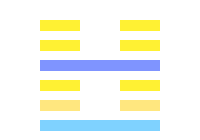
51.3.4.5.6 (51 > 37) - THE KĂN HEXAGRAM.
- 3. The third line, divided, shows its subject distraught amid the startling movements going on. If those movements excite him to (right) action, there will be no mistake.
- 4. The fourth line, undivided, shows its subject, amid the startling movements, supinely sinking (deeper) in the mud.
- 5. The fifth line, divided, shows its subject going and coming amidst the startling movements (of the time), and always in peril ; but perhaps he will not incur loss, and find business (which he can accomplish).
- 6. The topmost line, divided, shows its subject, amidst the startling movements (of the time), in breathless dismay and looking round him with trembling apprehension. If he take action, there will be evil. If, while the startling movements have not reached his own person and his neighbourhood, (he were to take precautions), there would be no error, though his relatives might (still) speak against him.
51.3.4.5.6 (51 > 37) - Shock
One fills out a form to obtain special rights.
Bing DeepL Google Yandex51.3.4.5.6 (51 > 37) - Shock
One fills out a form to obtain special rights.
Bing DeepL Google Yandex51.3.4.5.6 (51 > 37) - Kán, l’ébranlement
Kán : tonnerre, effroi répandu, crainte.
- 3. Le tonnerre émeut, agite ; il pousse à agir justement.
- 4. Le tonnerre approchant trouble et interdit [avant même l’éclair].
- 5. Le tonnerre allant et venant répand l’effroi ; mais on doit tâcher de ne pas abandonner les affaires entreprises. Même dans le danger pressant, on doit garder le milieu.
-
6. Le tonnerre répand l’effroi et fait partout regarder avec trouble et crainte. S’il atteint et frappe, il causera un grand mal. (Ou : il corrige le mal.) Mais s’il ne frappe ni tel personnage, ni ses voisins, ce ne sera point un mal et fera seulement jaser les habitants d’une même maison.
Quand le tonnerre gronde, que l’orage éclate, le sage recherche la cause de ce fait (et tâche de profiter de l’avertissement céleste).
51.3.4.5.6 (51 > 37) - Le choc
On remplit un formulaire pour obtenir des droits spéciaux.
Bing DeepL Google Yandex51.3.4.5.6 (51 > 37) - Megrázkódtatás
- 3. Meglátva a szakadást otthagyja őket.
- 4. Meg kell szabadítania magát a többiektől mielőtt tovább mehetne.
- 5. Szilárdan áll a megrázkódtatás kezdetekor és végigkíséri a többieket míg véget nem ér.
- 6. Elvesztette a leggyengébbet, visszafogottnak kell maradnia míg nem változnak.
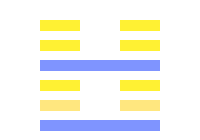
51.1.3.4.5.6 (51 > 53) - THE KĂN HEXAGRAM.
- 1. The first line, undivided, shows its subject, when the movement approaches, looking out and around with apprehension, and afterwards smiling and talking cheerfully. There will be good fortune.
- 3. The third line, divided, shows its subject distraught amid the startling movements going on. If those movements excite him to (right) action, there will be no mistake.
- 4. The fourth line, undivided, shows its subject, amid the startling movements, supinely sinking (deeper) in the mud.
- 5. The fifth line, divided, shows its subject going and coming amidst the startling movements (of the time), and always in peril ; but perhaps he will not incur loss, and find business (which he can accomplish).
- 6. The topmost line, divided, shows its subject, amidst the startling movements (of the time), in breathless dismay and looking round him with trembling apprehension. If he take action, there will be evil. If, while the startling movements have not reached his own person and his neighbourhood, (he were to take precautions), there would be no error, though his relatives might (still) speak against him.
51.1.3.4.5.6 (51 > 53) - Shock
One tells one's life to strangers because they don't know who they are dealing with.
Bing DeepL Google Yandex51.1.3.4.5.6 (51 > 53) - Shock
One tells one's life to strangers because they don't know who they are dealing with.
Bing DeepL Google Yandex51.1.3.4.5.6 (51 > 53) - Kán, l’ébranlement
Kán : tonnerre, effroi répandu, crainte.
- 1. Le tonnerre approchant, on est plein d’effroi ; puis, quand il est passé, on sourit et on parle tous ensemble (on passe de la crainte à la joie).
- 3. Le tonnerre émeut, agite ; il pousse à agir justement.
- 4. Le tonnerre approchant trouble et interdit [avant même l’éclair].
- 5. Le tonnerre allant et venant répand l’effroi ; mais on doit tâcher de ne pas abandonner les affaires entreprises. Même dans le danger pressant, on doit garder le milieu.
-
6. Le tonnerre répand l’effroi et fait partout regarder avec trouble et crainte. S’il atteint et frappe, il causera un grand mal. (Ou : il corrige le mal.) Mais s’il ne frappe ni tel personnage, ni ses voisins, ce ne sera point un mal et fera seulement jaser les habitants d’une même maison.
Quand le tonnerre gronde, que l’orage éclate, le sage recherche la cause de ce fait (et tâche de profiter de l’avertissement céleste).
51.1.3.4.5.6 (51 > 53) - Le choc
On raconte sa vie à des inconnus car ils ne savent pas à qui ils ont affaire.
Bing DeepL Google Yandex51.1.3.4.5.6 (51 > 53) - Megrázkódtatás
- 1. Nevethet miután meglátja.
- 3. Meglátva a szakadást otthagyja őket.
- 4. Meg kell szabadítania magát a többiektől mielőtt tovább mehetne.
- 5. Szilárdan áll a megrázkódtatás kezdetekor és végigkíséri a többieket míg véget nem ér.
- 6. Elvesztette a leggyengébbet, visszafogottnak kell maradnia míg nem változnak.
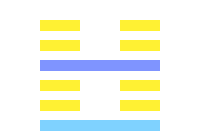
51.2.3.4.5.6 (51 > 9) - THE KĂN HEXAGRAM.
- 2. The second line, divided, shows its subject, when the movement approaches, in a position of peril. He judges it better to let go the articles (in his possession), and to ascend a very lofty height. There is no occasion for him to pursue after (the things he has let go) ; in seven days he will find them.
- 3. The third line, divided, shows its subject distraught amid the startling movements going on. If those movements excite him to (right) action, there will be no mistake.
- 4. The fourth line, undivided, shows its subject, amid the startling movements, supinely sinking (deeper) in the mud.
- 5. The fifth line, divided, shows its subject going and coming amidst the startling movements (of the time), and always in peril ; but perhaps he will not incur loss, and find business (which he can accomplish).
- 6. The topmost line, divided, shows its subject, amidst the startling movements (of the time), in breathless dismay and looking round him with trembling apprehension. If he take action, there will be evil. If, while the startling movements have not reached his own person and his neighbourhood, (he were to take precautions), there would be no error, though his relatives might (still) speak against him.
51.2.3.4.5.6 (51 > 9) - Shock
One shows one's friends what are the difficulties that others have hidden.
Bing DeepL Google Yandex51.2.3.4.5.6 (51 > 9) - Shock
One shows one's friends what are the difficulties that others have hidden.
Bing DeepL Google Yandex51.2.3.4.5.6 (51 > 9) - Kán, l’ébranlement
Kán : tonnerre, effroi répandu, crainte.
- 2. Quand le tonnerre gronde, le danger arrive, on croit devoir tout abandonner et se retirer en un lieu sûr et élevé. Qu’on ne s’obstine pas à rechercher alors ce qu’on a abandonné ; on le retrouvera quelque temps après. (Quand le danger sera passé.)
- 3. Le tonnerre émeut, agite ; il pousse à agir justement.
- 4. Le tonnerre approchant trouble et interdit [avant même l’éclair].
- 5. Le tonnerre allant et venant répand l’effroi ; mais on doit tâcher de ne pas abandonner les affaires entreprises. Même dans le danger pressant, on doit garder le milieu.
-
6. Le tonnerre répand l’effroi et fait partout regarder avec trouble et crainte. S’il atteint et frappe, il causera un grand mal. (Ou : il corrige le mal.) Mais s’il ne frappe ni tel personnage, ni ses voisins, ce ne sera point un mal et fera seulement jaser les habitants d’une même maison.
Quand le tonnerre gronde, que l’orage éclate, le sage recherche la cause de ce fait (et tâche de profiter de l’avertissement céleste).
51.2.3.4.5.6 (51 > 9) - Le choc
On montre à ses amis quelles sont les difficultés que les autres ont dissimulées.
Bing DeepL Google Yandex51.2.3.4.5.6 (51 > 9) - Megrázkódtatás
- 2. Ne keresse ami elveszett.
- 3. Meglátva a szakadást otthagyja őket.
- 4. Meg kell szabadítania magát a többiektől mielőtt tovább mehetne.
- 5. Szilárdan áll a megrázkódtatás kezdetekor és végigkíséri a többieket míg véget nem ér.
- 6. Elvesztette a leggyengébbet, visszafogottnak kell maradnia míg nem változnak.
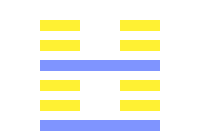
51.1.2.3.4.5.6 (51 > 57) - THE KĂN HEXAGRAM.
- 1. The first line, undivided, shows its subject, when the movement approaches, looking out and around with apprehension, and afterwards smiling and talking cheerfully. There will be good fortune.
- 2. The second line, divided, shows its subject, when the movement approaches, in a position of peril. He judges it better to let go the articles (in his possession), and to ascend a very lofty height. There is no occasion for him to pursue after (the things he has let go) ; in seven days he will find them.
- 3. The third line, divided, shows its subject distraught amid the startling movements going on. If those movements excite him to (right) action, there will be no mistake.
- 4. The fourth line, undivided, shows its subject, amid the startling movements, supinely sinking (deeper) in the mud.
- 5. The fifth line, divided, shows its subject going and coming amidst the startling movements (of the time), and always in peril ; but perhaps he will not incur loss, and find business (which he can accomplish).
- 6. The topmost line, divided, shows its subject, amidst the startling movements (of the time), in breathless dismay and looking round him with trembling apprehension. If he take action, there will be evil. If, while the startling movements have not reached his own person and his neighbourhood, (he were to take precautions), there would be no error, though his relatives might (still) speak against him.
51.1.2.3.4.5.6 (51 > 57) - Shock
One apologises profusely so as not to have to do more chores.
Bing DeepL Google Yandex51.1.2.3.4.5.6 (51 > 57) - Shock
One apologizes profusely so as not to have to do more chores.
Bing DeepL Google Yandex51.1.2.3.4.5.6 (51 > 57) - Kán, l’ébranlement
Kán : tonnerre, effroi répandu, crainte.
- 1. Le tonnerre approchant, on est plein d’effroi ; puis, quand il est passé, on sourit et on parle tous ensemble (on passe de la crainte à la joie).
- 2. Quand le tonnerre gronde, le danger arrive, on croit devoir tout abandonner et se retirer en un lieu sûr et élevé. Qu’on ne s’obstine pas à rechercher alors ce qu’on a abandonné ; on le retrouvera quelque temps après. (Quand le danger sera passé.)
- 3. Le tonnerre émeut, agite ; il pousse à agir justement.
- 4. Le tonnerre approchant trouble et interdit [avant même l’éclair].
- 5. Le tonnerre allant et venant répand l’effroi ; mais on doit tâcher de ne pas abandonner les affaires entreprises. Même dans le danger pressant, on doit garder le milieu.
-
6. Le tonnerre répand l’effroi et fait partout regarder avec trouble et crainte. S’il atteint et frappe, il causera un grand mal. (Ou : il corrige le mal.) Mais s’il ne frappe ni tel personnage, ni ses voisins, ce ne sera point un mal et fera seulement jaser les habitants d’une même maison.
Quand le tonnerre gronde, que l’orage éclate, le sage recherche la cause de ce fait (et tâche de profiter de l’avertissement céleste).
51.1.2.3.4.5.6 (51 > 57) - Le choc
On se répand en excuses pour ne pas avoir à faire davantage de corvées.
Bing DeepL Google Yandex51.1.2.3.4.5.6 (51 > 57) - Megrázkódtatás
- 1. Nevethet miután meglátja.
- 2. Ne keresse ami elveszett.
- 3. Meglátva a szakadást otthagyja őket.
- 4. Meg kell szabadítania magát a többiektől mielőtt tovább mehetne.
- 5. Szilárdan áll a megrázkódtatás kezdetekor és végigkíséri a többieket míg véget nem ér.
- 6. Elvesztette a leggyengébbet, visszafogottnak kell maradnia míg nem változnak.

